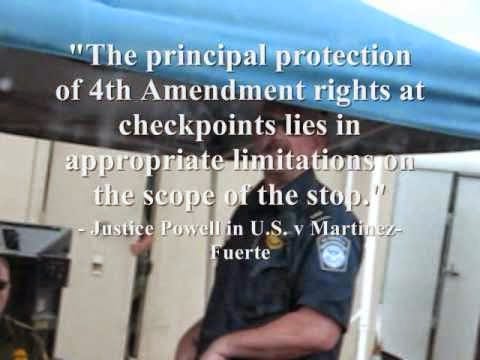Appellate judge slams DOJ over immigration checkpoint detentions

The Fifth Circuit US Court of Appeals heard a Justice Department official argue that agents have the right to indefinitely detain "uncooperative" motorists at border roadblocks far from the actual border.
US Air Force Major Richard Rynearson was stopped on March 18, 2010 when he came to an immigration checkpoint on Highway 90 in Uvalde, Texas, 67 miles from the border with Mexico. The Justice Department attorney got off to a bad start with the three-judge panel.
"To take the position of plaintiff in this case, this court would have to hold that, as plaintiffs and amicus insist, that they have a right to say nothing," Justice Department attorney Steve Frank said. "To just pull up at a checkpoint stop..."
At this point, Judge Jennifer Elrod interrupted.
"That's not true," Judge Elrod said. "That's just absolutely not true. We would not have to hold anything so broad. We would have to hold if you cooperate you can't be held for thirty minutes in what's supposed to be a quick stop and that everybody should know that if you don't have probable cause you, can't keep holding someone there for lengthy periods of time after you produce your identification."
Immigration roadblocks are supposed to be for the sole purpose of establishing US citizenship at the border, but the courts have expanded the definition of "border" to include anything within 100 miles of the border. Although Rynearson offered a military ID, passport and driver's license, Border Patrol agents were peeved that Rynearson did not fully roll down his window and asked if he was being detained.
"What is the purpose of going to call the commanding officer at the military base?" Judge Elrod asked. "What does that have to do at all with citizenship?"
The district court threw out the case, denying a discovery request that would have taken depositions to find out what was said on the phone calls. Rynearson is asking the three-judge panel to send the case back to the district court so a jury can decide whether the Border Patrol agents should pay for violating Rynearson's Fourth Amendment rights.
"At one point the officer tells Mr. Rynearson that they don't need probable cause to hold him," Judge Elrod said. "Is that legally correct? ...Could you hold someone overnight at the border stop?"
The Justice lawyer argued that because there was no "clearly established precedent" saying a stop longer than five minutes was unconstitutional that the officers could not be held personally liable for their conduct.
"There's no law here," Frank said. "There's no law that says how long you can detain someone, what kind of questions you can ask."
http://thenewspaper.com/news/45/4508.asp
How to refuse a DUI checkpoint:


